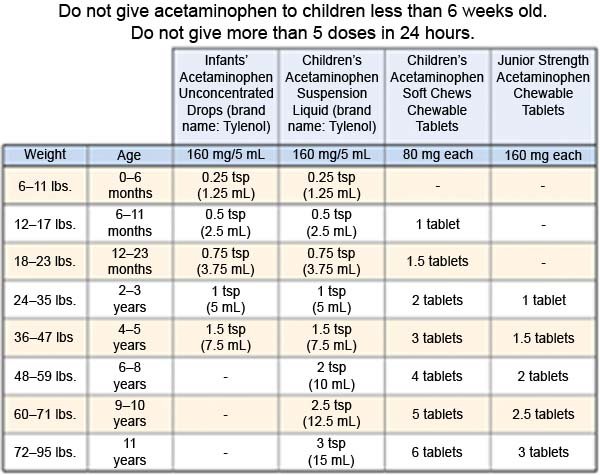Safe Use of Acetaminophen
Medically reviewed by Drugs.com. Last updated on Apr 6, 2025.
What do I need to know about the safe use of acetaminophen?
The safe use of acetaminophen means you follow guidelines to prevent an overdose. An overdose means you took more than is safe to take. It may also be called acetaminophen poisoning. An acetaminophen overdose can cause life-threatening liver damage.
What safety guidelines do I need to follow?
Talk to your healthcare provider or a pharmacist if you have any questions about acetaminophen safety. The following are general guidelines:
- Do not use acetaminophen if you have severe liver disease. Too much acetaminophen can cause liver damage or make it worse.
- Do not use acetaminophen if you regularly have 3 or more drinks of alcohol in 24 hours. Alcohol can cause liver damage. The damage will be worse if you combine acetaminophen with alcohol. A drink of alcohol is 12 ounces of beer, 5 ounces of wine, or 1½ ounces of liquor.
- Read the directions on the label. Check how much medicine you should take and how often to take it. Do not take more than the recommended amount, or for longer than directed. If you need to give acetaminophen to your child, read the label to find the correct amount to give. This is based on your child's age and weight. Ask his or her provider or a pharmacist if you are not sure how much to give.

- Ask your infant's healthcare provider before you give acetaminophen to infants younger than 12 weeks. If your provider tells you to give it to your infant, he or she will give you specific instructions to follow.
- Use the measuring tool that came with the medicine. Do not use another measuring tool, such as a kitchen spoon. Other measuring tools are not accurate. You may give too much acetaminophen by accident.
- Check other medicines to see if they contain acetaminophen. Acetaminophen is used to decrease pain and fever. It is also found in cold, cough, and prescription pain medicines. Do not use any of these medicines along with acetaminophen. The combined amount of acetaminophen may be too much. Acetaminophen may be listed on the label as APAP, Acetaminoph, Acetaminop, Acetamin, or Acetam. Ask a healthcare provider or pharmacist if you are not sure.
- Talk to your provider or a pharmacist if you regularly take other medicines, herbs, or supplements. Some cause acetaminophen to stay in your body longer than normal. This makes lower doses of acetaminophen (less than 4,000 milligrams) more dangerous.
What do I need to know about an acetaminophen overdose?
Seek immediate care for any possible overdose. Treatment is most effective when started within 8 hours of the overdose.
- The maximum daily amount of acetaminophen varies by form and strength. Acetaminophen comes in many forms, such as pills, capsules, and liquids. Strengths include regular strength, extra strength, and extended release. The most acetaminophen that is safe for most people to take is 4,000 milligrams (4 grams) in a 24-hour period. Some forms of acetaminophen need to be limited to lower doses, such as 3,000 mg (3 grams). Only a healthcare provider can recommend a larger maximum dose. Read the label to find the maximum daily amount. Ask your provider or a pharmacist if you are not sure.
- Liver damage can occur if you take too much acetaminophen at one time or over time. You may not develop symptoms right away. Within 24 hours of an overdose, you may develop nausea, vomiting, and abdominal pain. With the second or third day, you may develop upper abdominal pain and tenderness on your right side. With severe poisoning, your skin may turn yellow, and you may become confused and very sleepy.
What should I do if I think my child or I took too much acetaminophen?
Immediately call the Poison Control Center at 1-800-222-1222 .
When should I seek immediate care?
- You have nausea, vomiting, and abdominal pain.
- You develop upper abdominal pain and tenderness on your right side.
- Your skin becomes yellow, you become confused, and you are very sleepy.
When should I call my doctor?
- You do not know how much acetaminophen to give to your child.
- You have questions or concerns about your condition or care.
Care Agreement
You have the right to help plan your care. Learn about your health condition and how it may be treated. Discuss treatment options with your healthcare providers to decide what care you want to receive. You always have the right to refuse treatment. The above information is an educational aid only. It is not intended as medical advice for individual conditions or treatments. Talk to your doctor, nurse or pharmacist before following any medical regimen to see if it is safe and effective for you.© Copyright Merative 2025 Information is for End User's use only and may not be sold, redistributed or otherwise used for commercial purposes.
Learn more about Safe Use of Acetaminophen
Care guides
Further information
Always consult your healthcare provider to ensure the information displayed on this page applies to your personal circumstances.
